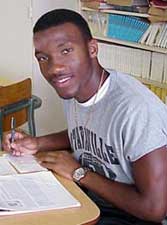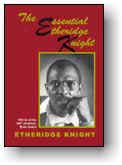Major Works
- The Essential Etheridge Knight (1986)
- Born of a Woman: New and Selected Poems (1980)
- Belly Song and Other Poems (1973)
- For Black Poets Who Think of Suicide (1972)
- A Poem for Brother Man (1972)
- Poems from Prison (1968)
- The Idea of Ancestry (1968)
- 2 Poems for Black Relocation Center (1968)
Etheridge Knight: A Biography
by Mitchell Evans, Jr. (SHS)
Etheridge Knight was born in Corinth, Mississippi, in 1931. He was one of seven children born to a poor rural family. Knight dropped out of school at the age of fourteen (Magill 419), but his “education in the uses and joys of language continued as he explored the world of juke joints, pool halls and underground poker games” (www.poets.com). When he became seventeen, he joined the army as a medical technical and saw active service in Korea, where he received a schrapnel wound. Treatment for that wound increased his addiction to narcotics. In 1960, he was a robber, and one day he was arrested for snatching an elderly white woman’s purse (Magill 419). He was sentenced to ten to twenty years in the state penitentiary (Lumpkin, 203).
In jail, he started reading The Autobiography of Malcolm X and the poetry of Langston Hughes (Magill 420). He started thinking about what the other black poets were doing in life. It made him want to write poems for other people who wanted to read and understand the truth in poetry (Lumpkin 206). By 1968, Etheridge’s first book of poems was published called Poems from Prison (www.poets.com). Scholar Shirley Lumpkin says that his work was” perfect for black writers and is a perfect example of the powerful truth of blackness in act.”
For example: Once on a Night in the Delta: A Report from Hell tells us about how inequality was still going on in Mississippi when he wrote the poem. Other black or white poets talk about what makes a person feel good, but Knight’s poems tell the reader what other poets leave out of their poems (www.tsixroads.com). In the poem The Idea of Ancestry, Knight mentions that he is in jail and that they are forty-seven pictures representing himself in some kind of way. Everything that has happened to him in his life, his family feels his pain; and every time something happens to one of his family members, he can always feel their pain and suffering. In prison he corresponded with poets Dudley Randal and Gwendolyn Brooks. After Knight started writing his poems, he told himself that he should get married and settle down with someone. So, he got married to a woman by the name of Sonia Sanchez, who was also a famous black poet (Abbott,165). Some of the other poets, like Gwendolyn Brooks, wrote that there is a “strong presence of blackness and maleness in Knight’s poetry” (www.tsixroads.com).
In the 1980’s, Knight “absorbed more Afro, Anglo, European and American African literary traditions into his body and that inspired him to form a passionate, loving connection with black and white readers” (www.tsixroads.com). Another poem by Knight, Born of a Woman, balances his personal suffering and affirmation. He “introduced the concept of the poet as a ‘meddler ‘ who forms a trinity with the poem and the reader” (www.blackhistory/micro.com).
Knight’s books and oral performances drew both popular and critical acclaim, and he received honors from such institutions as the Guggenheim Foundation, The National Endowment of the Arts, and The Poetry Society of America. He taught at various universities. In 1987 his The Essential Etheridge Knight won the American Book Award. In 1990, he earned a bachelor’s degree in American poetry and criminal justice from Martin Center University in Indianapolis (Abbott 165). Knight died of lung cancer in Indianapolis in 1991. (Magill 422).
Timeline
- 1931: April 19,1931. Etheridge Knight was born in Corinth, Mississippi.
- 1945: Knight dropped out of school.
- 1947-51: Knight served in the U.S. Army in Korea where he received his scrapnel wound.
- 1960: He was arrested for robbery and sentenced to eight years in the Indiana State Prison, Indiana
- 1968: Knight’s first book was published. The name of the book was Poems from Prison.
- Mid 1970: Married to Sonia Sanchez (another poet) for a short time.
- 1970: Published a book of poems in a collection calledBlack Voices from Prison.
- 1973: Published a book called Belly Song and other Poems.
- 1974: He worked two years as a editor of Motive and a contributing editor of New Letters.
- 1980: Published Born of a Woman.
- 1986: Published his books in a collection called The Essential Etheridge Knight.
- 1987: The Essential Etheridge Knight receives the American Book Award.
- 1990: He earned a bachelor’s degree in American poetry and criminal justice from Martin Center University in Indianapolis.
- 1991: Etheridge Knight died of lung cancer
Related Websites
- Poem “The Idea of Ancestry” and a brief biography of Knight can be found here.
- Article after Knight’s death in El Paso Herald-Post, June 17, 1991.
Bibliography
- Abbott, Dorothy. ed. “Poems for Myself.”. Mississippi writers: Reflections of Childhood and Youth. University Press of Mississippi: 1988. 163.
- Abbott, Dorothy, ed. “Bones of my Father.” Mississippi writers: Reflections of Childhood and Youth. University Press of Mississippi: 1988.163.
- Abbott, Dorothy, ed. “The Idea of Ancestry.” Mississippi writers: Reflections of Childhood and Youth. University Press of Mississippi: 1988. 165.
- Abbott, Dorothy, ed.”llu, The Talking Drum.” Mississippi writers: Reflections of Childhood and Youth . University Press of Mississippi: 1988. 166.
- Abbott, Dorothy, ed. “Once on a Night in the Delta: A Report from Hell.”Mississippi writers: Reflections of Childhood and Youth. University Press of Mississippi: 1988. 167.
- Gates, Henry. ed. The Norton Anthology: African American Literature. W.W. Norton & Co. New York: 1997.
- Forkner, Ben & Sameway, Patrick, ed.” The Idea of Ancestry.” A Modern Southern Reader. S. J.. Atlanta: Peach Tree Publishers. 1986. 293.
- Lumpkin, Shirley. “Etheridge Knight.” Afro- American Poets Since 1955. Trudier Harris & Thadius M. Davis, Michigan: GAle Research Company, 1985. 202-211.
- Marowski, Daniel.G, ed. “Etheridge Knight.” Rpt. inContemporary Literary Criticism. Vol. 40. Detroit: Gale.1986. 283-285.
- Lang, Richard. A., ed. “The Violent Spaces.” Afro- American Writing. The Pennsylvania State University Press: 1985.733-734.
- Lang, Richard. A. ed.. “He Sees Through Stone.” Afro- American Writing. The Pennsylvania State University Press: 1985. 731- 732.
- Magill, Frank. N.,ed.. “The Poetry of Etheridge Knight.” Masterpieces of African-American Literature. Harper Collins: 1992. 419-422.
- Knight, Etheridge. Biography of Etheridge Knight. [online] Available http:// www. poets.org/poets/lit/poet/eknight.html. April 19, 2000.
- Knight, Etheridge. Biography of Etheridge Knight.[online] Available http:// 207.138.35.143/blackhistory/micro/726/75.html. April 14, 2000.
- Knight Etheridge.”Etheridge Knight: 1931-1991.” [online] Available http:// www.tsixroads.com/Corinth_ MLSANDY/mw005.html. April 14, 2000


